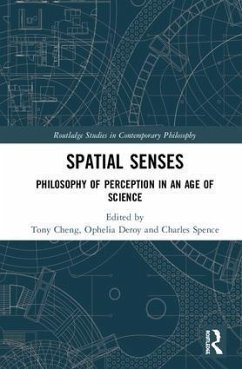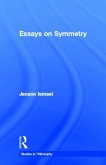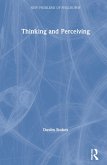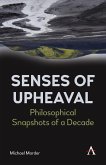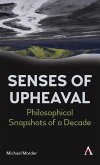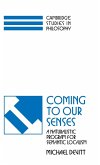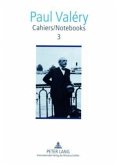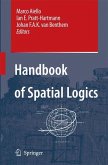Spatial Senses
Philosophy of Perception in an Age of Science
Herausgeber: Cheng, Tony; Spence, Charles; Deroy, Ophelia
Spatial Senses
Philosophy of Perception in an Age of Science
Herausgeber: Cheng, Tony; Spence, Charles; Deroy, Ophelia
- Gebundenes Buch
- Merkliste
- Auf die Merkliste
- Bewerten Bewerten
- Teilen
- Produkt teilen
- Produkterinnerung
- Produkterinnerung
This collection of essays brings together research on sense modalities and spatial perception in a systematic and interdisciplinary way. It updates a long-standing philosophical fascination with this topic by incorporating theoretical and empirical research from cognitive science, neuroscience, and psychology.
Andere Kunden interessierten sich auch für
![Essays on Symmetry Essays on Symmetry]() Jenann IsmaelEssays on Symmetry229,99 €
Jenann IsmaelEssays on Symmetry229,99 €![Thinking and Perceiving Thinking and Perceiving]() Dustin StokesThinking and Perceiving180,99 €
Dustin StokesThinking and Perceiving180,99 €![Senses of Upheaval Senses of Upheaval]() Michael MarderSenses of Upheaval40,99 €
Michael MarderSenses of Upheaval40,99 €![Senses of Upheaval Senses of Upheaval]() Michael MarderSenses of Upheaval135,99 €
Michael MarderSenses of Upheaval135,99 €![Coming to our Senses Coming to our Senses]() Michael DevittComing to our Senses89,99 €
Michael DevittComing to our Senses89,99 €![Cahiers / Notebooks 3 Cahiers / Notebooks 3]() Paul ValéryCahiers / Notebooks 3112,95 €
Paul ValéryCahiers / Notebooks 3112,95 €![Handbook of Spatial Logics Handbook of Spatial Logics]() Handbook of Spatial Logics224,99 €
Handbook of Spatial Logics224,99 €-
-
-
This collection of essays brings together research on sense modalities and spatial perception in a systematic and interdisciplinary way. It updates a long-standing philosophical fascination with this topic by incorporating theoretical and empirical research from cognitive science, neuroscience, and psychology.
Hinweis: Dieser Artikel kann nur an eine deutsche Lieferadresse ausgeliefert werden.
Hinweis: Dieser Artikel kann nur an eine deutsche Lieferadresse ausgeliefert werden.
Produktdetails
- Produktdetails
- Verlag: Routledge
- Seitenzahl: 356
- Erscheinungstermin: 11. Juni 2019
- Englisch
- Abmessung: 235mm x 157mm x 24mm
- Gewicht: 666g
- ISBN-13: 9781138506411
- ISBN-10: 1138506419
- Artikelnr.: 57049727
- Herstellerkennzeichnung
- Libri GmbH
- Europaallee 1
- 36244 Bad Hersfeld
- gpsr@libri.de
- Verlag: Routledge
- Seitenzahl: 356
- Erscheinungstermin: 11. Juni 2019
- Englisch
- Abmessung: 235mm x 157mm x 24mm
- Gewicht: 666g
- ISBN-13: 9781138506411
- ISBN-10: 1138506419
- Artikelnr.: 57049727
- Herstellerkennzeichnung
- Libri GmbH
- Europaallee 1
- 36244 Bad Hersfeld
- gpsr@libri.de
Tony Cheng is a Ph.D. Candidate at University College London, UK. His works have been published in Phenomenology and Cognitive Sciences, Philosophical Investigations, Philosophical Psychology, and Trends in Cognitive Sciences . Ophelia Deroy holds the Chair in Philosophy of Mind at Ludwig-Maximilians University, Germany, and is also the Deputy Director of the Institute of Philosophy at the University of London, UK. Her work has appeared in Multisensory Research, Philosophical Studies, and the Oxford Handbook of Philosophy of Perception, and she is the editor of Sensory blending: on synaesthesia and related phenomena. Charles Spence is Professor of Experimental Psychology and Head of the Crossmodal Research Laboratory at the University of Oxford, UK. He is the co-author of In touch with the future: The sense of touch from cognitive neuroscience to virtual reality (2014), and also the author of various other books. He has hundreds of papers in high-profile journals.
Preface
Tony Cheng
Introduction: Sensing in and of Space
Tony Cheng, Ophelia Deroy, and Charles Spence
Part I: 21st Century Oxford Kantianism, or: Transcendental Philosophy
Naturalised?
1. Strawson and Evans on Objectivity and Space
Paul F. Snowdon
2. Is Bálint's Syndrome a Counterexample of the Kantian Spatiality Thesis?
Tony Cheng
Part II: Perceptual Magnitudes, Phenomenal Space, and Frames of Reference
3. Spatial Perception, Magnitudes, and Analogue Representation
Christopher Peacocke
4. Wittgenstein, Spatial Phenomenology, and the "Private Language Argument"
Thomas Raleigh
5. The Two-Visual-Systems Hypothesis and the View from Here
Robert Foley
Part III: Sounds, Smells, and Space
6. Why Space Matters to an Understanding of Sounds
Elvira Di Bona
7. Smell-Scapes: A Neurobiological and Ecological Perspective
Johannes Frasnelli and Raphaël Proulx
8. The Many Problems of Distal Olfactory Perception
Benjamin D. Young
9. Spatial Awareness and the Chemical Senses
Barry C. Smith
Part IV: Body Spaces
10. Spatial Certainty: Feeling is the Truth
Ophelia Deroy and Merle Fairhurst
11. Peripersonal Space: Its Functions, Plasticity, and Neural Basis
Eleonora Vagnoni and Matthew Longo
12. On the Very Idea of a Tactile Field, or: A Plea for Skin Space
Tony Cheng
Part V: Molyneux's Question and Multimodality
13. Objectivity and Unity across the Modalities: Molyneux's Question
Revisited
Naomi Eilan
14. Molyneux's Question within and across the Senses
John Schwenkler
15. Evaluating the Spatial Rule of Multisensory Integration
Charles Spence
16. The Inside-Out Binding Problem
Léa Salje
Tony Cheng
Introduction: Sensing in and of Space
Tony Cheng, Ophelia Deroy, and Charles Spence
Part I: 21st Century Oxford Kantianism, or: Transcendental Philosophy
Naturalised?
1. Strawson and Evans on Objectivity and Space
Paul F. Snowdon
2. Is Bálint's Syndrome a Counterexample of the Kantian Spatiality Thesis?
Tony Cheng
Part II: Perceptual Magnitudes, Phenomenal Space, and Frames of Reference
3. Spatial Perception, Magnitudes, and Analogue Representation
Christopher Peacocke
4. Wittgenstein, Spatial Phenomenology, and the "Private Language Argument"
Thomas Raleigh
5. The Two-Visual-Systems Hypothesis and the View from Here
Robert Foley
Part III: Sounds, Smells, and Space
6. Why Space Matters to an Understanding of Sounds
Elvira Di Bona
7. Smell-Scapes: A Neurobiological and Ecological Perspective
Johannes Frasnelli and Raphaël Proulx
8. The Many Problems of Distal Olfactory Perception
Benjamin D. Young
9. Spatial Awareness and the Chemical Senses
Barry C. Smith
Part IV: Body Spaces
10. Spatial Certainty: Feeling is the Truth
Ophelia Deroy and Merle Fairhurst
11. Peripersonal Space: Its Functions, Plasticity, and Neural Basis
Eleonora Vagnoni and Matthew Longo
12. On the Very Idea of a Tactile Field, or: A Plea for Skin Space
Tony Cheng
Part V: Molyneux's Question and Multimodality
13. Objectivity and Unity across the Modalities: Molyneux's Question
Revisited
Naomi Eilan
14. Molyneux's Question within and across the Senses
John Schwenkler
15. Evaluating the Spatial Rule of Multisensory Integration
Charles Spence
16. The Inside-Out Binding Problem
Léa Salje
Preface
Tony Cheng
Introduction: Sensing in and of Space
Tony Cheng, Ophelia Deroy, and Charles Spence
Part I: 21st Century Oxford Kantianism, or: Transcendental Philosophy
Naturalised?
1. Strawson and Evans on Objectivity and Space
Paul F. Snowdon
2. Is Bálint's Syndrome a Counterexample of the Kantian Spatiality Thesis?
Tony Cheng
Part II: Perceptual Magnitudes, Phenomenal Space, and Frames of Reference
3. Spatial Perception, Magnitudes, and Analogue Representation
Christopher Peacocke
4. Wittgenstein, Spatial Phenomenology, and the "Private Language Argument"
Thomas Raleigh
5. The Two-Visual-Systems Hypothesis and the View from Here
Robert Foley
Part III: Sounds, Smells, and Space
6. Why Space Matters to an Understanding of Sounds
Elvira Di Bona
7. Smell-Scapes: A Neurobiological and Ecological Perspective
Johannes Frasnelli and Raphaël Proulx
8. The Many Problems of Distal Olfactory Perception
Benjamin D. Young
9. Spatial Awareness and the Chemical Senses
Barry C. Smith
Part IV: Body Spaces
10. Spatial Certainty: Feeling is the Truth
Ophelia Deroy and Merle Fairhurst
11. Peripersonal Space: Its Functions, Plasticity, and Neural Basis
Eleonora Vagnoni and Matthew Longo
12. On the Very Idea of a Tactile Field, or: A Plea for Skin Space
Tony Cheng
Part V: Molyneux's Question and Multimodality
13. Objectivity and Unity across the Modalities: Molyneux's Question
Revisited
Naomi Eilan
14. Molyneux's Question within and across the Senses
John Schwenkler
15. Evaluating the Spatial Rule of Multisensory Integration
Charles Spence
16. The Inside-Out Binding Problem
Léa Salje
Tony Cheng
Introduction: Sensing in and of Space
Tony Cheng, Ophelia Deroy, and Charles Spence
Part I: 21st Century Oxford Kantianism, or: Transcendental Philosophy
Naturalised?
1. Strawson and Evans on Objectivity and Space
Paul F. Snowdon
2. Is Bálint's Syndrome a Counterexample of the Kantian Spatiality Thesis?
Tony Cheng
Part II: Perceptual Magnitudes, Phenomenal Space, and Frames of Reference
3. Spatial Perception, Magnitudes, and Analogue Representation
Christopher Peacocke
4. Wittgenstein, Spatial Phenomenology, and the "Private Language Argument"
Thomas Raleigh
5. The Two-Visual-Systems Hypothesis and the View from Here
Robert Foley
Part III: Sounds, Smells, and Space
6. Why Space Matters to an Understanding of Sounds
Elvira Di Bona
7. Smell-Scapes: A Neurobiological and Ecological Perspective
Johannes Frasnelli and Raphaël Proulx
8. The Many Problems of Distal Olfactory Perception
Benjamin D. Young
9. Spatial Awareness and the Chemical Senses
Barry C. Smith
Part IV: Body Spaces
10. Spatial Certainty: Feeling is the Truth
Ophelia Deroy and Merle Fairhurst
11. Peripersonal Space: Its Functions, Plasticity, and Neural Basis
Eleonora Vagnoni and Matthew Longo
12. On the Very Idea of a Tactile Field, or: A Plea for Skin Space
Tony Cheng
Part V: Molyneux's Question and Multimodality
13. Objectivity and Unity across the Modalities: Molyneux's Question
Revisited
Naomi Eilan
14. Molyneux's Question within and across the Senses
John Schwenkler
15. Evaluating the Spatial Rule of Multisensory Integration
Charles Spence
16. The Inside-Out Binding Problem
Léa Salje

